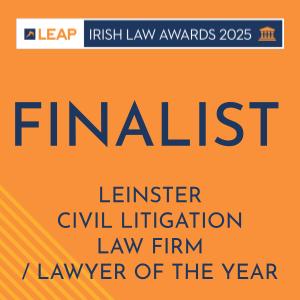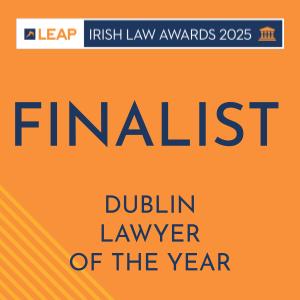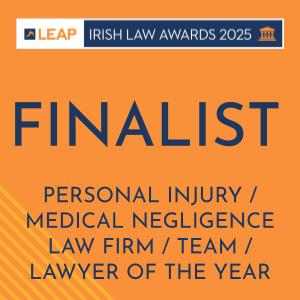If you, or a loved one of yours, has unfortunately suffered from a catastrophic (life changing) brain injury and that injury was caused by the negligence or failure of someone else to take proper care, then a case may be brought to receive financial compensation.
Catastrophic brain injury cases can either be a personal injury claim (e.g. if the injury arose in road traffic accident or the work place) or a medical negligence claim (e.g. if the injury arose from a mishandled surgical procedure).
Establishing Liability & Negligence for a Catastrophic Brain Injury* Claim
An account should be taken of what the individual was like before the injury and the family should be alert to any changes in personality, should they present themselves.
The injured person is called the Plaintiff. It is crucially important for the Plaintiff’s solicitors to be aware of how deeply unique a brain injury is to any particular client. The injuries may be physical (e.g. tiredness, coordination issues, seizures, incontinence etc.) There may be cognitive changes (e.g. poor memory, problem solving issues, language difficulties etc.) There may also be emotional and behavioural consequences (e.g. personality change, anger, irritability, impulsiveness, depression etc.)
The Plaintiff’s solicitors should be alert to which part(s) of the brain have been damaged. The parts of the brain are the different lobes and each part of the brain controls different bodily functions.
One of the first things a Plaintiff’s solicitor will need to do is obtain an expert report which positively supports the argument that the brain injury arose as a result of another person’s or party’s negligence. The speciality of the expert/s will depend on how that injury arose.
For example, if the injury arose as a result of a personal injury, such as a road traffic accident, that expert may be a forensic engineer. If the injury arose as a result of potential medical negligence case (for example a surgery), that expert who comments on negligence might be a neurosurgeon. Depending on the unique circumstances of your case, you may require a number of reports from experts of varying professions before liability & negligence can be established.
Issuing Proceedings
Once your solicitors have obtained a supportive report, they can then begin the process of bringing about court proceedings after they have completed the applicable requirements under the Personal Injuries Board Act 2003. Proceedings for catastrophic brain injury claims are typically issued in the High Court.
The person or party who allegedly caused the injury is called the Defendant. When your proceedings have been issued, the solicitors for the Defendant will obtain their own expert reports which comment on the issues of liability and negligence. To facilitate with their investigation, the solicitors for the Defendant will request for your solicitors to issue them with a copy of the relevant medical records and any other records relating to the accident. This process is called ‘discovery’.
Establishing Quantum
Broadly, there are three categories of reports that your solicitor will obtain for the purpose of building your case.
The first category of reports are those relating to liability & causation.
The second category of reports are medical reports. If appropriate, some of these reports may be obtained from your treating doctors e.g. your neurologist, your neurosurgeon, your GP and very importantly a neuropsychologist who endeavors to take all the information and assess the impact of the brain injury on the individual.
The third category of reports is quantum reports. These are the reports which your solicitors will use for the purpose of calculating the bulk of the value of your claim for compensation. Your solicitors will instruct a number of experts to assess your current needs and what your needs will look like moving into the future.
Quantum experts can include physiotherapists, occupational therapists, care consultants, speech & language therapists, housing experts, assistive technology experts, vocational assessors, psychologists, rehabilitation consultants etc. These experts will make a number of recommendations to help you live a more independent life moving into the future.
For example, the housing expert may advise in relation to the costs of building a home to make it fully accessible. The nursing expert will make recommendations in respect of the number of private care hours you may require. The occupational therapist will advise in respect of your equipment needs and their associated costs. Looking towards the future, the vocational assessor will ascertain your future loss of earnings.
Finally, an actuary will review all of those quantum reports to calculate the total value of those future recommendations.
The costs that have been built up to date will also be included in the claim. For example, the cost of making any adaptions to the child’s home will be included and additionally, the hours put in by loved ones caring for the child will be valued (this is known as ‘retrospective care’).
The solicitors for the Defendant will typically obtain like for like quantum reports. This means that for every type of expert your solicitor sends you to, the Defendant will arrange for you to see an expert of the same profession for them. The Defendant’s experts will also ascertain your past & future needs. However, the value of their recommendations is often much lower than the value of the recommendations made by your own experts. This is where negotiating will come into play.
As you can probably tell by now, obtaining the appropriate expert reports are crucial for firstly being successful and secondly, for achieving favourable compensation.
Counsel
Your solicitors will hire barristers or ‘counsel’ on your behalf. In a catastrophic brain injury case, you will have a junior barrister and 1 – 2 senior barristers. Your solicitors and counsel will work together as your legal team.
Your counsel will advocate for you in court, prepare some of the legal documents that must be filed in a case and provide legal opinions on whether or not you have a good legal case and will advise your solicitor in respect of steps to take to overcome certain issues that may crop up. Finally, your counsel will be the person who negotiates a settlement of your case if it does not go to trial.
Therefore, it is extremely important for your solicitors to hire counsel on your behalf who are not only experienced in handling personal injury and medical negligence claims, but who also have an in depth experience of dealing with complex catastrophic spinal injury claims.
Conclusion of a Case
The vast majority of cases end up settling outside of the court room, however, there is never a guarantee that a case will not go to trial.
If a case proceeds to trial, the judge will hear evidence from each party and each of the parties’ expert witnesses. The judge will then decide whether or not to make an award in your favour.
If a case is settled or if an award is made by a judge, then typically the insurance company for the Defendant will make the payment (in the case of personal injuries) and the State Claims Agency will typically make the payment (in the case of medical negligence cases).
Compensation
If you have been successful with your claim for compensation, then you may receive a lump sum payment or an interim settlement or periodic payments. Although the courts are currently not disposed to making periodic payments, we will always engage an expert to secure his view on this point.
If you have full mental capacity and if you are over the age of 18 years, you may then spend this money how you see fit.
If the claimant is under the age of 18, then the funds are typically lodged in the High Court until the child turns 18 years old. In the meantime, the child’s next friend (typically a parent or guardian) will be permitted to take out monies to cover the child’s expenses and to make big purchases such as housing and equipment.
Our clients often use the funds to build a fully accessible home, purchase an accessible car, pay for private care hours and private medical treatments and purchase equipment to help them live more independent lives and to also allow them to resume old hobbies or even take up new hobbies.
Advice should be secured from a tax expert to ring fence any monies that are secured in the settlement so that tax is not paid on any income that is generated by investments.
Immediate Steps to Take
Here are of the first steps that you should take if you are considering taking legal action in respect of your brain injury:
- If you are aged 18 years or over, you only have two years to lodge a claim from the date of your injury in normal circumstances (there are some limited exceptions to this). Therefore, it is crucial that you firstly make contact with a solicitor who can then advise you whether or not you might have a claim. Your solicitor can then start the work on lodging your claim within the two-year time frame from the date of the injury and if necessary, make arrangements to preserve any evidence. If you are enquiring on behalf of a child who is below the age of 18, then the time window is much more extensive. The statutory time limit of 2 years only starts from when the child turns 18. The child’s next friend has the ability to bring a claim on their behalf at any point in time if the child is under the age of 18.
- If you can, you should down all the details that you can recall in respect of when and how the injury occurred. This can be a particularly difficult exercise to do after experiencing such a traumatic event, but it will be of tremendous benefit to your potential new solicitors.It will assist them with the process of taking your formal instructions. A loved one can help with this exercise. You should make a note of crucial details such as what you were doing on the day of the accident or injury, the timing of those activities, how the accident occurred, who you were with, and what medical services you immediately received, The sooner you write down those details the better.
- Another step you can take to possibly speed up the early stages of the investigation is to obtain all of your medical records, radiology and reports from the hospitals you attended. Information on how to obtain those records will be available on the hospital’s website. is also advisable to take up a copy of the medical records held by your GP.
Choosing a Specialist Firm of Solicitors
Suffering from a brain injury can be devastating not only for the person who was injured, but also for that person’s loved ones. It is often the case that the injured person was previously the sole or main provider in their home and they are now suddenly incapacitated and left without an income. Importantly, and aside from the sudden and unexpected financial burden the injury has created, it is often the case that the once independent person is now reliant on their family members for their care needs. This can place both a mental and physical toll on all involved.
It is therefore important that you engage solicitors who have a full understanding of the nature of brain injuries and the impact they have both from the medical side of things and in terms of how they can affect the whole family.
Your solicitors must know who the leading experts are and be able to competently instruct them with all the relevant details so that you can ultimately obtain meaningful compensation to help safeguard your future and to enable you to live a more independent life.
We at McMahon Goldrick Solicitors, understand that clients who have suffered from a catastrophic brain injury have very specific needs and concerns. Therefore, we purposefully maintain a very low number of files so that individual attention can be given to each client.
We have over 60 years’ combined experience and we only deal with catastrophic injuries so the specialist nature of our office allows us gently glide over hurdles that others may, with the best will in the world, procrastinate about.
Over the years, we have established professional connections with the top medics and expert witnesses who are involved with these types of cases.
Our clients are informed in “real time” of any developments and they get their case heard as soon as possible but without taking any shortcuts.
Without ever losing sight of the sensitivity of the injury, we go about our work in that empathetic and honest way, completely aware of how difficult and anxious having a catastrophic brain injury is. Clients often confide in us and share private matters with us. We respect that. We want to walk in the client’s shoes with them.
Please, as always, email or telephone us with any queries on a non-committal basis.




